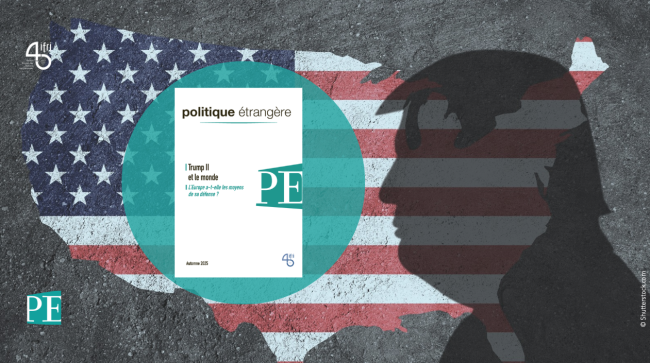The Future of U.S. Leadership

The French Institute for International Relations (Ifri) and The German Marshall Fund of the United States - France (GMF) have partnered to launch a joint research program on the transformations of U.S. leadership by the year 2020.
This project, which will include the publication of eight articles, seeks to analyze and anticipate the emerging and future changes in U.S. foreign policy in the context of a complex international environment. Policy changes are notably perceptible in the innovative instruments of governance that were put forth in the 21st Century Statecraft doctrine and the recent emphasis on the economic dimension of U.S. foreign policy (Economic Statecraft), which the Obama administration has laid out since 2009.
The last half of the following paper is in English: The Future of U.S. Leadership
Related centers and programs
Discover our other research centers and programsFind out more
Discover all our analysesBrazil One Year Away from the October 2026 General Elections
Brazil’s general elections will be held on October 4, 2026, to elect the president, vice-president, members of the National Congress, governors, deputy governors and state legislative assemblies. For the presidential and gubernatorial elections, a second round will be held on October 25 if no candidate obtains a majority of the votes in the first round.
Trump II: The Clash of Ideologies
The second Trump administration brings together a number of very different, even opposing, ideologies: far-right populism, the reactionary Christian right, paleolibertarianism, and technolibertarianism. The most visible measures taken since Donald Trump's return to the White House have been populist in nature, with the president's authority strengthened, checks and balances weakened, a form of identity politics embraced, and economic nationalism implemented.
Water in Mexico: an Emergency that Will Wait
Access to water is already and will become increasingly problematic for Mexican economic actors due to the progressive scarcity of the resource resulting from climate change, a geographical distribution that does not coincide with that of the population or economic activity, and management that has so far been far too lax.
Donald Trump v. the States: the Case of New York
While the disruptive policies of the second Trump administration are being implemented at the federal level and on the international stage, they are also being felt in the federal states and major cities across the country. In the spring of 2025, several cases involving the state and city of New York demonstrate that the president’s attacks on environmental protection, the separation of powers, freedom of speech, etc., are also being carried out at the local level.













